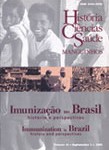Aug 2015
 A proposal presented by História, Ciências, Saúde– Manguinhos and the Journal of Latin American Studies, published by Cambridge University Press, one of the top global journals in Latin American Studies, entitled ‘Latin American Studies Journals in the Twenty-First century: The UK and Brazilian experiences’ has received the prestigious a Newton Mobility Grant of the British Academy for the humanities and social sciences (http://www.britac.ac.uk/).
A proposal presented by História, Ciências, Saúde– Manguinhos and the Journal of Latin American Studies, published by Cambridge University Press, one of the top global journals in Latin American Studies, entitled ‘Latin American Studies Journals in the Twenty-First century: The UK and Brazilian experiences’ has received the prestigious a Newton Mobility Grant of the British Academy for the humanities and social sciences (http://www.britac.ac.uk/).
The aim of this one-year project, to begin in September of 2015, is to strengthen collaboration between UK and Brazilian academic communities and in particular in the field of Latin American studies through exchange of knowledge and expertise in relation to the editing, management and publishing of academic journals.
The project will include reciprocal visits to the UK and Brazil of editors of the journals with lectures and meetings aimed at facilitating knowledge and skills transfer and the organization of a workshop, with the provisional date of June of 2016, which will involve editors of other UK based and Latin America-based journals. The workshop will serve to discuss some relevant issues such as: Open Access policies, Concerns in University Libraries (such as space for printed materials), Digital formats, and use of internet (Facebook, blogs, twitter), Challenges and concerns and characteristics of readers, authors and reviewers and internal organization of academic journals.
As a whole, the project will address some crucial questions such as: What role have Latin American studies journals played in the formation and dissemination of knowledge on Latin America? To what extent has the turn to interdisciplinary in the social and historical sciences been reflected in Latin American studies journals? Is English the main language of academic communication in Latin American studies and what implications does this have for Latin American studies journals published in other languages? What are best-practice editorial practices in the UK and Latin America? Are they transferable? What challenges and opportunities do Latin American studies journals face? What steps should be taken to strengthen academic human capacities in a middle-income developing country such as Brazil? What can UK-based academics learn from the experience of their Brazilian and Latin American colleagues?
The project will help us not only to increase the global visibility of our journals but also to assess experiences with the aim of increasing academic standards in both journals. We will identify the editorial policies that can work in a developed and in a middle income country like Brazil that plays a leading role in academic periodicals in the Latin American region and explore creating a common database for possible reviewers (identifying suitable and qualified reviewers is always a difficult task for editors). For the Brazilian journal it will be an opportunity to train its editorial staff and board and as a byproduct enhance the performance of the journal. In sum, the project will be a remarkable joint learning experience in transnational academic cooperation.
The blog of História, Ciências, Saúde– Manguinhos will publish soon an interview of Paulo Drinot, editor of the Journal of Latin American Studies and senior lecturer at the University College London, who will provide more details of this important award.








